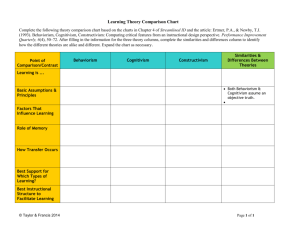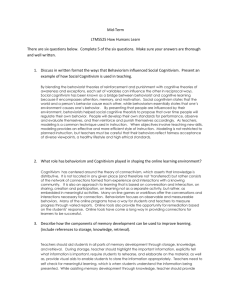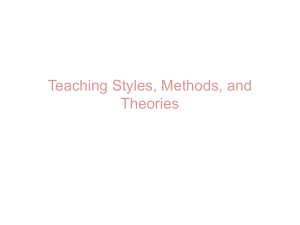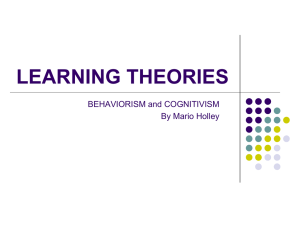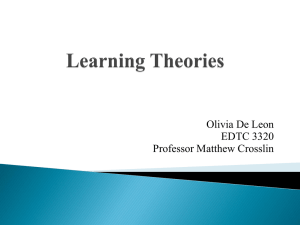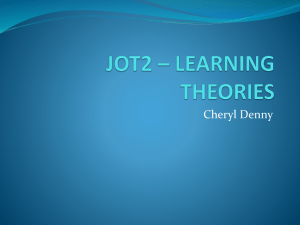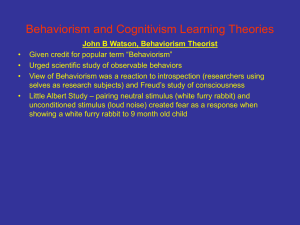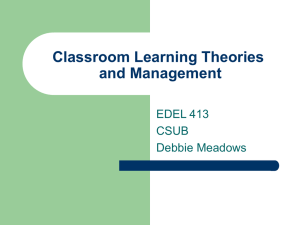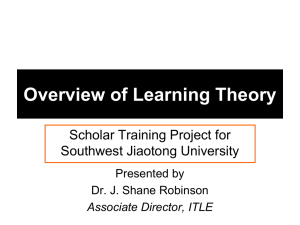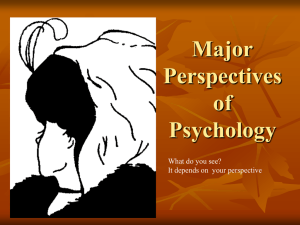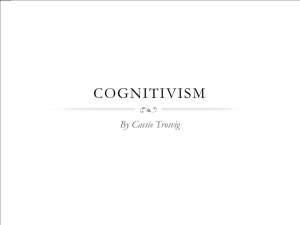Psychological Foundation
advertisement
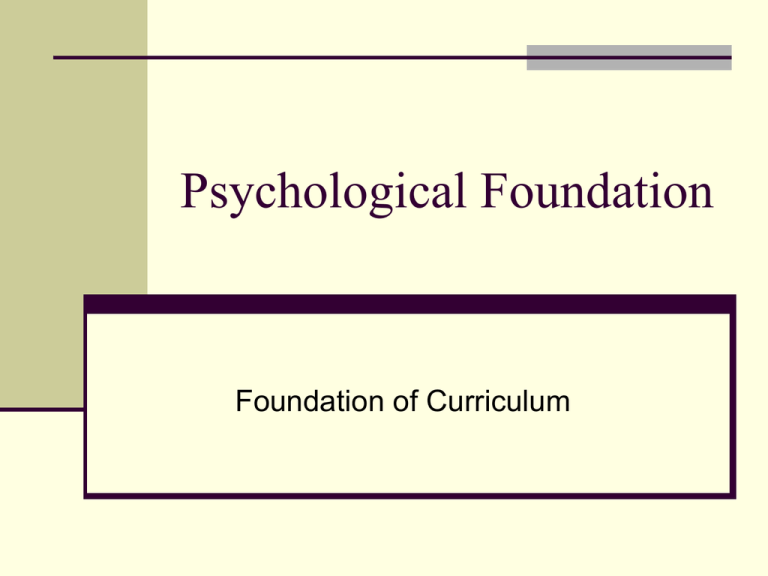
Psychological Foundation Foundation of Curriculum Psychology How do we learn (and think)? Why do students respond to teaching? And why do they respond differently? Curriculum Teaching and Learning are Interrelated Curriculum and psychology Psychology and Curriculum Psychology - curriculum Basis of understanding – John Dewey a “screen” – Ralp Tyler Modes of thinking – Jerome Bruner “Unifying elements of the learning process. It forms the basis for the methods, materials, and activity of learning… serves… for many curriculum decision (p. 100)” Major Theories of Learning Behaviorism – stimulus and reinforces Cognitivism – mental operation Humanistic psychology – whole child (social, psychology, and cognitive development) Behaviorism Connectionism (Thorndike) Theory Laws of learning (learning connection) Law of readiness, law of exercise, law of effect Specific stimuli and specific responses Influences Tyler – generalized view of learning Bobbitt and Charters – Specific Habits to be acquired Taba – problem-solving and inquiry-discovery Bruner – “Learning how to learn” Behaviorism Classical Conditioning (Pavlov, Watson) Theory Stimuli association (Bell and food) Key to learning Condition the child in early years of life to train them what you want them to be Behaviorism Operant Conditioning (Skinner) Theory Elicited responses– definite stimulus Emitted responses– unrelated identifiable stimulus Key to learning Operant behavior – role of stimuli is less definite (Emitted) Reinforcement (Positive and Negative) Behaviorism Operant Conditioning (Skinner) Theory Elicited responses– definite stimulus Emitted responses– unrelated identifiable stimulus Key to learning Operant behavior – role of stimuli is less definite (Emitted) Reinforcement (Positive and Negative) Lead to acquisition of new operants – Behavior modification Behaviorism Observational Learning and Modeling (Bandura) Theory People learn through observation and modeling Key to learning Through modeling, learner can learn how to perform at sophisticated levels of performance Behaviorism Hierarchical Learning (Gagné) Theory The behaviors are based on prerequisite conditions. 8 types of learning: Signal learning, stimulus response, motor chains, verbal association, multiple discrimination, concepts, rules, and problem solving Key to learning Cummulative process of learning Learning outcomes can be measured Behaviorism and Curriculum Curriculum should be organized so students experience success in master the subject matter. Behaviorist are very prescriptive and diagnostic in their approach. Rely on step-by-step structured methods for learning. Behaviorism in curriculum includes careful analyzing and sequencing of the learners’ needs and behaviors. Cognitivism Theories of Jean Piaget Describes cognitive development in terms of stages from birth to maturity Sensorimotor stage (0-2), preoperational stage (2-7), concrete operations stage (7-11) and formal operations (11 – onwards) Key to learning Assimilation (incorporation of new experience), accommodation (learning modification and adaptation) and equilibration (balance between previous and later learning) Cognitivism Influence Tyler’s method - 1. Continuity – Vertical curriculum, 2. Sequence – Spiral curriculum (past experience builds upon the preceding one), 3. Integration – Horizontal curriculum Taba: Curriculum strategies for productive learning (Based on assimilation, accomodation and equilibration) Bruner – Acquisition, Transformation, and Evaluation Kholberg – Preconventional (no sense of right or wrong), Conventional (concerned about what people think), Postconventional (morality is based on what other people feel Cognitivism Theory of Lev Vygotsky Cultural transmission and development Children could, as a result of their interaction with society, actually perform certain cognitive actions prior to arriving at developmental stage Learning precedes development Sociocultural development theory Key to Learning Pedagogy creates learning processes that lead to development Child is an active agent in his or her educational process Cognitivism Thinking and Learning theories Gardner’s multiple intelligences. Learning styles: Myth??? Goleman’s emotional intelligence. – Emotion contain the power to affect action. Cognitivism Constructivism (Vygotsky) Individual as the active person in the process of thinking, learning and coming to know Learner is the key player Key to learning The learner constructs understanding from the inside, not from an external source. Learners must make knowledge personally relevant Individual must construct own knowledge- make meaning Cognitivism Other Problem Solving and Thinking Theories Reflective thinking (Dewey) Critical thinking (Ennis, Lipman and Sternberg) Creative thinking (Fromm, Sternberg, Picasso, Dylan) Intuitive thinking (Bruner) Discover Learning (Phenix, Bruner, Taba) Cognitivism and Curriculum Why use cognitivism in curriculum making? Cognitive approach constitutes a logical method for organizing and interpreting learning Rooted in the tradition of subject matter Educators been trained in cognitive approaches Schools are the place for cognitive learning. Students should not afraid to ask, not afraid of being wrong, not afraid of not please teacher, and not afraid of taking risk and playing with ideas. Phenomenology/Humanistic Psychology Gestalt Theory (Gestalt) Learning is explained in terms of “wholeness” of the problem Human beings do not respond to isolated stimuli but to an organization or patter of stimuli. Key to learning Learning is complex and abstract Learner analyzes the problem, discriminates between essential and nonessential data, and perceive relationships. Learners will perceive something in relation to the whole. What/how they perceive it’s related to their previous experiences. Phenomenology/Humanistic Psychology Self-Actualization Theory (Maslow) Classic theory of human needs. A child whose basic needs are not met will not be interested in acquiring knowledge of the world Put importance in human emotions, based on love and trust Key to learning Produce a healthy and happy learner who can accomplish, grow and actualize his or her human self. Phenomenology/Humanistic Psychology Nondirective and Therapeutic Learning (Rogers) Established counseling procedures and methods for facilitating learning. Children’s perceptions, which are highly individualistic, influence their learning and behaviour in class. Key to learning Curriculum concerns with process, not product; personal needs, not subject matter, psychological meaning, not cognitive scores. Phenomenology/Humanistic Psychology and Curriculum Motivation and Achievement The Concept of Freedom Self esteem and self concept must be recognized as essential factors Affective needs are more important than cognitive needs Support and nurture Freedom permits the learners to probe, explore and deepen understanding Enhance learning opportunities and alternatives In search of Curriculum Leaners draw on experiences, subject matter, and intellectual skills to attain full potential Affection is measured through testimonials Curriculum that enhance the self-actualizing and selfdetermining learning process
